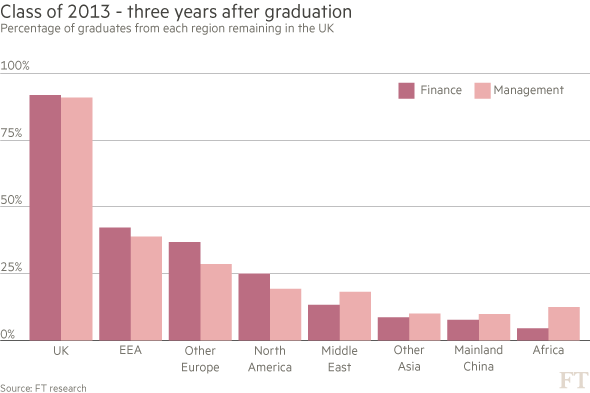UK loses grip on non-European business graduates

Roula Khalaf, Editor of the FT, selects her favourite stories in this weekly newsletter.
The UK is failing to retain highly skilled foreign graduates from its own business schools, the Financial Times reveals.
Since 2011, there have been markedly fewer graduates from outside the European Economic Area who are still working in the UK three years after they finished their masters degree from a top school.
Those staying make up 12 per cent in 2016 compared with 24 per cent five years ago, according to the FT data, gathered partly from its annual ranking of Masters in Finance programmes. The list is due to be published on June 20.
Immigration to the UK is at the centre of the domestic political debate ahead of a referendum on EU membership on June 23. But the trend for most young business school graduates to drift away from Britain after their studies suggests it is suffering a “brain drain” in this area.
Continental European countries are better at holding on to masters students coming to business schools from outside the EEA, made up of the 28 EU member states as well as Iceland, Liechtenstein and Norway.
Their retention rates over that three-year post-graduation period are four times greater than the UK’s — 43 per cent in 2016, only slightly down on the 48 per cent recorded in 2011.
The UK’s business schools are among the biggest successes of its education system, attracting a far higher number of international students than their counterparts in other countries.
In 2016, 92 per cent of the students enrolling in the pre-experience finance and management programmes ranked by the FT came from overseas. Of these, 83 per cent are from outside the EU, mostly from Asia and China in particular.
Pre-experience masters programme students are about 25 years old at graduation, an age when they might relish the chance to gain work experience abroad. So why do so few remain in the UK?
The effect is not linked to any particular industry since the retention rates from the specialised Masters in Finance and generalist Masters in Management programmes are about the same, 11 per cent and 12 per cent respectively. Even the pull of a City of London job is not sufficient for them to stay.

One explanation lies in the internship opportunities available on British programmes and their continental counterparts. While virtually all students in France and Belgium pursue internships as part of their programmes, only 9 per cent do so in the UK.
Internships give students a foothold in a company and increase their likelihood of staying in the country. Of all graduates who completed an internship, about 45 per cent did so in their country of study and two-thirds of them received a job offer.
The US is an exception to this rule though. The proportion of students in the US who do an internship is about the same as in the UK, but about 40 per cent of non-EEA and non-US graduates stay there for work. So there must be other factors influencing those in the UK.

A likely reason is that non-EEA graduates are being deterred by student visa regulations introduced by the British government in 2012. These created a barrier for non-EEA students who are willing to work in the UK after graduating, as they now need to find an employer willing to sponsor them.
“I have excellent credentials but UK companies do not care about you when you apply to them without a work visa,” says one Pakistani graduate from the University of Durham Business School.
Not all employers are willing to go through the process and small companies are more likely to be put off by the legislation, notes Sue Thorn, director of the careers service at Warwick Business School.
Confusion over the Tier 2 visa process, timings and costs is widespread.
Some students want a UK education but are not interested in working in the country. One finance graduate of Henley Business School said it was a well-recognised name in China “which helped a lot of my classmates to enter their dream place back home”. Apart from Indian students, the FT survey shows that most Asian students return home after graduation.
Comments